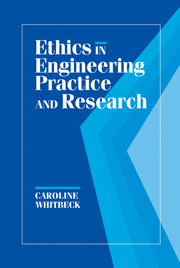Book contents
- Frontmatter
- Contents
- Preface
- Foreword
- INTRODUCTION TO ETHICAL CONCEPTS
- 1 ETHICS AS DESIGN: DOING JUSTICE TO ETHICAL PROBLEMS
- 2 THE BASIS AND SCOPE OF PROFESSIONAL RESPONSIBILITY
- 3 CENTRAL PROFESSIONAL RESPONSIBILITIES OF ENGINEERS
- 4 TWO MODELS OF PROFESSIONAL BEHAVIOR: ROGER BOISJOLY AND THE CHALLENGER, WILLIAM LEMESSURIER'S FIFTY-NINE STORY CRISIS
- 5 WORKPLACE RIGHTS AND RESPONSIBILITIES
- 6 RESPONSIBILITY FOR RESEARCH INTEGRITY
- 7 THE RESPONSIBILITY OF INVESTIGATORS FOR EXPERIMENTAL SUBJECTS
- 8 RESPONSIBILITY FOR THE ENVIRONMENT
- 9 FAIR CREDIT IN RESEARCH AND PUBLICATION
- 10 CREDIT AND INTELLECTUAL PROPERTY IN ENGINEERING PRACTICE
- EPILOG: MAKING A LIFE IN ENGINEERING AND SCIENCE
- Bibliography and References
- Index
10 - CREDIT AND INTELLECTUAL PROPERTY IN ENGINEERING PRACTICE
Published online by Cambridge University Press: 05 June 2012
- Frontmatter
- Contents
- Preface
- Foreword
- INTRODUCTION TO ETHICAL CONCEPTS
- 1 ETHICS AS DESIGN: DOING JUSTICE TO ETHICAL PROBLEMS
- 2 THE BASIS AND SCOPE OF PROFESSIONAL RESPONSIBILITY
- 3 CENTRAL PROFESSIONAL RESPONSIBILITIES OF ENGINEERS
- 4 TWO MODELS OF PROFESSIONAL BEHAVIOR: ROGER BOISJOLY AND THE CHALLENGER, WILLIAM LEMESSURIER'S FIFTY-NINE STORY CRISIS
- 5 WORKPLACE RIGHTS AND RESPONSIBILITIES
- 6 RESPONSIBILITY FOR RESEARCH INTEGRITY
- 7 THE RESPONSIBILITY OF INVESTIGATORS FOR EXPERIMENTAL SUBJECTS
- 8 RESPONSIBILITY FOR THE ENVIRONMENT
- 9 FAIR CREDIT IN RESEARCH AND PUBLICATION
- 10 CREDIT AND INTELLECTUAL PROPERTY IN ENGINEERING PRACTICE
- EPILOG: MAKING A LIFE IN ENGINEERING AND SCIENCE
- Bibliography and References
- Index
Summary
PATENTS AND TRADE SECRETS
INTELLECTUAL PROPERTY OF ENGINEERS IN PRIVATE PRACTICE
Roy, an engineer, submits a proposal for a city project to the county council. The proposal included technical information and data that the council requests. A staff member of the council makes Roy's proposal available to Thornton, another engineer. Thornton uses Roy's proposal to develop another proposal for a somewhat different project and submitted it to the council. The parties dispute the amount of Roy's information that Thornton used.
Is Thornton guilty of plagiarism? Does it make a difference, ethically speaking, if the amount of information used was large or small?
What are the city council's responsibilities in handling Roy's proposal?
THE USE OF WORK FROM AN UNPAID CONSULTATION
A state agency considers designing a facility that requires special expertise in the field of solar energy. They learn from a federal agency that the Moreau firm had previously developed a plan for a similar facility for that agency, and so they contact the Moreau firm. The Moreau firm submits preliminary data to the state agency, who in turn includes that information in a proposal to a private foundation to secure additional funds for the project. The state agency holds many informal discussions with Moreau's firm and so leads that firm to believe that, if the project is approved, it will be awarded the contract.
- Type
- Chapter
- Information
- Ethics in Engineering Practice and Research , pp. 295 - 305Publisher: Cambridge University PressPrint publication year: 1998

